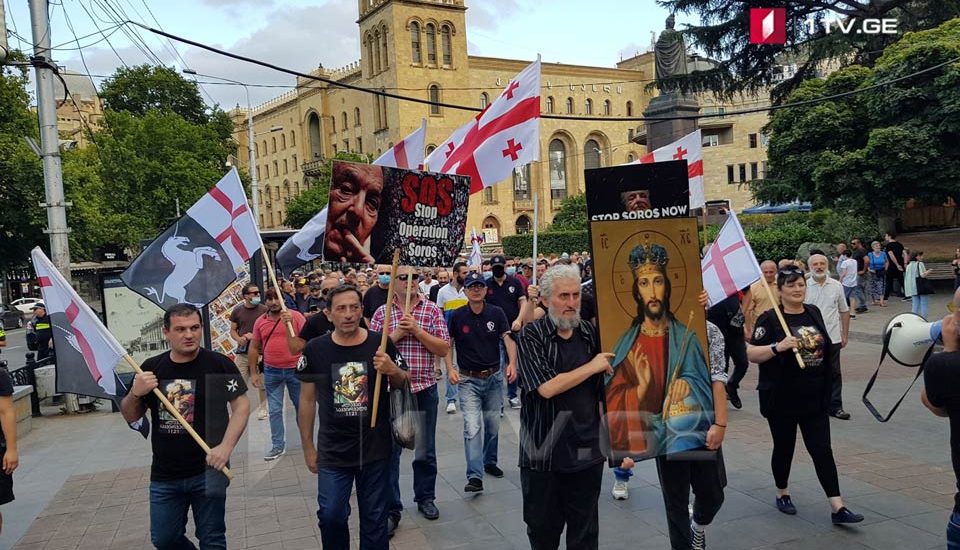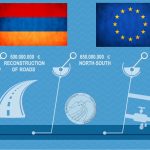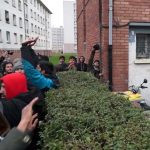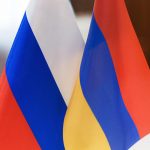- 27 June, 2022
- Foreign Policy

Following the Velvet Revolution in Armenia in 2018, when the vast majority of citizens rejected the former government and the leader of the opposition became the Prime Minister of the country as a result of snap elections, the propaganda that some conspirators (particularly, the Open Society Foundations) were behind the revolution became more intense. Some citizens who supported the previous government began to oppose the activities of the Open Society Foundations – Armenia, stating that they “intend to destroy the country”, and many of the citizens who got government positions after the revolution, as well as most of the civil society, were called “Sorosian”.
Most recently, lawyers Tigran Atanesyan and Margarita Gyulumyan filed a lawsuit to liquidate Open Society Foundations – Armenia.
Georgia
However, this phenomenon is not unique to Armenia. The struggle against Soros seems to follow the script written by the same person in other countries of the world as well. For example, about two years after the Rose Revolution in Georgia in November 2003, the Anti-Soros movement was formed, uniting various forces that had previously opposed the Soros Foundation, and mostly consisting of ultra-rightists. Among them was Manana Archvadze-Gamsakhurdia, the widow of the first president of Georgia Zviad Gamsakhurdia. They demanded that the foundation be closed down.
Although the protests outside the Open Society Foundations office in Georgia had started much earlier, on October 3, 2005, a new movement called “Anti-Soros” was formed. Representatives of this movement accused Soros of “selling Georgia, annexing it.” One of the leaders of the movement, Temur Zhorzholiani, announced that day that all the problems in the country are related to Soros։ “Destruction of the education system, destruction of the Academy of Sciences, spiritual crisis․ It is all related to Soros.” The founders of this movement were the supporters and partners of the second president Eduard Shevardnadze and the president of the Autonomous Republic of Adjara Aslan Abashidze.
One of the founders of the “Anti-Soros” movement was Maya Nikoleishvili. The latter was also the founder of the “Forward, Georgia” movement, which united like-minded politicians supporting President Eduard Shevardnadze, who resigned as a result of the revolution. Maya Nikoleishvili had previously received grants from the Open Society Foundations. During the movement’s founding, Nikoishvili said she did not know what her projects had been used for.
However, the paradox was that the real founder of the “Anti-Soros” movement was the former head of the Georgian National Security Service Igor Giorgadze, who was accused of organizing a terrorist attack against Shevardnadze and was in Russia. A criminal case was filed against him in Georgia. Giorgadze has been wanted by Interpol since 1995. Meanwhile, rumors were circulating that Giorgadze was cooperating with Russian special services, and that the Georgian authorities announced that Giorgadze had been granted asylum in Russia. Although on April 23, 2002, Deputy Director of the Russian Federal Security Service Viktor Kamagorov stated that they did not know of Giorgadze’s whereabouts and had nothing to do with him, later in 2006, Russia’s Deputy Prosecutor General offered him asylum. Although the latter stated that he did not want political asylum, he received it de facto and continues to live in Russia. He is considered a defender of Russian interests in Georgia.
In 2006, 12 members of Giorgadze’s Justice Party were arrested. They were accused of plotting an armed coup, overthrow of the government and seizure of power by force. One of the leaders of the “Anti-Soros” movement, Maya Nikoleishvili, was also arrested on the same charges. She later pleaded guilty to the charges and testified against the others. Nikoleishvili was released after testifying. One of her supporters, Koka Kvinikadze, said after her release from prison that Nikoleishvili’s husband was a prosecutor. In the same interview, Kvinikadze also stated that they were against “pursuing an aggressive policy” against Russia. “It was necessary to create a movement that would show everyone where the unconscious policy of the authorities could lead,” Kvinikadze said.
It is also noteworthy that this was happening before the local elections, and the former Minister of Security Giorgadze (who was in Russia) threatened the Georgian authorities with the “Nettle Revolution“. Giorgadze also insisted that “cooperation with Russia will be one of his priorities.”
This is how the protests in Georgia against the activities of George Soros ended. Giorgadze is still in Russia and often makes various statements. In 2018, he spoke out against US-funded Lagouri Laboratories in Georgia, saying that “experiments are being carried out on humans and biological weapons are being made.”
In 2012, a change of government took place in Georgia. For the first time in the history of the country, the government changed as a result of the elections. The second wave of the anti-Soros movement began during the new government, the “Georgian Dream”. Ahead of the 2017 local elections, a “Georgian March” movement was formed in the country to oppose illegal migrants, and then began to organize homophobic rallies. It is noteworthy that this movement again positioned itself against the former government, Saakashvili’s “United National Movement”. For example, on March 19, 2018, the movement organized a rally in front of the opposition “Rustavi 2” TV channel “for insuling the religious feelings of the people”.
In September of the same year, the movement organized a rally in front of the Open Society Foundations office in Georgia, after which the rally moved to the office of Tbilisi mayoral candidate Kakha Kaladze. The demonstrators demanded a ban on Soros’s office in Georgia, as well as demanded that authorities not sell agricultural land to foreigners. Although the rally moved to the office of one of the prominent figures in the ruling party, Kakha Kaladze, the protesters only demanded that he state his position on the matter. It is noteworthy that the “Georgian March” called some members of the ruling team “Soros’ slaves.” Former parliament speaker Irakli Kobakhidze was also among them.
Later, the “Georgian March” repeatedly organized street struggle against the opposition. In particular, they launched several counter-protests against the European Georgia opposition party. They also carried out counter-protests during anti-fascist protests.
Norik Gasparyan
Union of Informed Citizens




